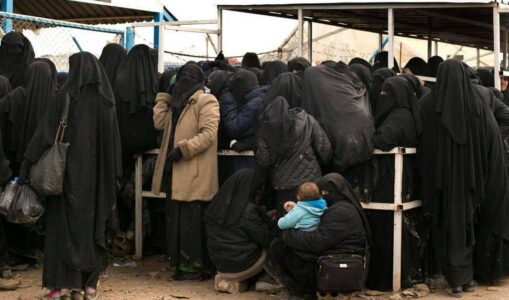
Guards in the al-Hol camp are helpless against Islamic State death squads preying on Syrian refugees
Al-Hol camp, a detention centre housing Islamic State supporters in northeast Syria is desolate, hostile and extremely dangerous – and security is deteriorating.
When the Telegraph visited on Monday, camp guards said the body of an Iraqi man found that morning was the 40th murder victim in the camp this year.
Fear permeates the camp, with few people willing to speak to Western journalists. Children regularly throw stones at visitors and guards report being frequently attacked, with at least one having been killed.
“There is no security here, everyone is afraid,” said a Syrian man who is living in the camp.
The detention centre holds perhaps the largest concentration of Islamic State supporters and affiliates anywhere.
They represent the hardcore remnants and followers of the extremist group, whose short-lived caliphate briefly engulfed a third of Iraq and Syria before imploding on the banks of the Euphrates under a firestorm of coalition air strikes outside a farming village called Baghouz in early 2019.
Two years after that battle, 60,990 people are held in limbo at Al-Hol in ever-worsening security, camp officials say.
Extrapolated, the rate of killings at Al-Hol would suggest an annual per capita murder rate of about 341 per 100,000, nearly three times higher than any city in any country not at war.
Despite the danger to a population that is made up mostly of children, few foreign governments have repatriated their citizens. Several thousand Syrians have been released in tribal reconciliation agreements in recent months, while an unknown but not insignificant number of people have escaped.
While the Kurdish-led de facto rulers of northeast Syria struggle to control the camp’s perimeter, even the guards acknowledge that IS sleeper cells wield more influence over the inhabitants of Al-Hol.
Jaber Mustafa, the head of public relations at the camp, said militants run an underground Sharia Court to try those deemed to be infidels or thought to be spying for the guards.
Nocturnal death squads then carry out executions inside tents using silenced pistols and knives. Decapitations are common, while one elderly Iraqi man was reportedly executed in public in January.
A Hisbah or morality police unit enforces Islamic State strictures, including draconian modesty codes, Mr Jaber said. Every woman at Al-Hol remains shrouded head to toe in black robes.
Partly in response to the deteriorating security, since last year authorities have moved most British and Western citizens to the smaller and more secure Roj camp, which is far less afflicted by jihadist violence.
Authorities at Roj have banned black clothing and face veils and a significant number of women, including Shamima Begum, have subsequently voluntarily given up Islamic dress entirely.
Those left at Al-Hol are mostly women and children, with the majority from Iraq and Syria, with about 8,000 other foreigners living in a smaller camp annex.
An underground IS insurgency active in the nearby border region supplies its supporters inside the camp with weapons and money.
With a huge perimeter and hundreds of workers entering the camp daily, often in trucks and water tankers, stopping the smuggling of weapons in and people out is extremely difficult, according to an intelligence officer at the camp.
The intelligence officer, a young woman who withheld her name for security reasons, said that even when murders are committed publicly, witnesses never come forward.
“We try to identify the extremist leaders but it’s difficult because the leaders remain hidden,” she said.
Those who are identified are imprisoned, while authorities also have a plan to compartmentalise the camp into separate sections to stop the movement of these sleeper cells.
“We applied this strategy in Roj camp and it’s working there,” said Mr Mustafa.
In the absence of IS enforcers at Roj, camp guards say many women have drifted away from the group’s extremist ideology, though it is not clear this represents permanent deradicalisation.
“Some change their ideology in front of us but when they leave the camp they revert back,” said the intelligence officer.
International NGOs providing aid in both camps are generally opposed to restrictions on freedom of movement on humanitarian grounds. But Mr Mustafa said that if they cannot restore order, he fears that NGOs will withdraw entirely from Al-Hol, particularly as staff are targeted simply for working for foreign organisations.
On February 24, a local employee of Medecins Sans Frontieres (MSF) was killed in their tent at the camp. The killing and the subsequent death several days later of another staff member’s child in an accidental camp fire prompted the NGO to suspend its outreach activities within the camp.
In a statement at the time, MSF’s emergency manager for Syria, Will Turner, said: “This is not a safe environment and certainly not a suitable place for children to grow up in. This nightmare must stop.”
For Mr Jaber, the only solution is for foreign governments to take back their citizens. “It’s too big a problem for us to handle,” he said.
Source: MSN





